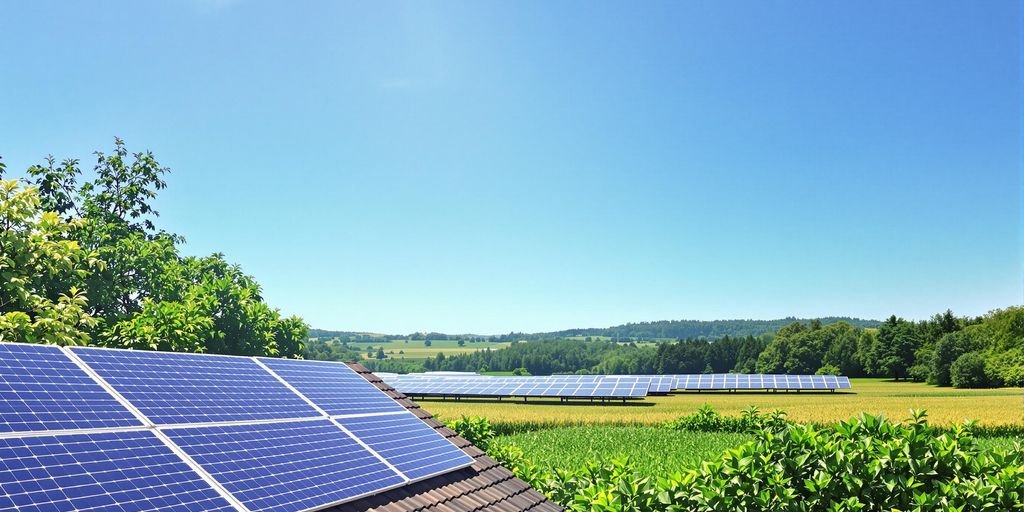When it comes to solar energy, separating fact from fiction is crucial. You might be surprised to learn that common misconceptions about solar power could be holding you back from exploring its benefits fully. By debunking these myths, you can gain a clearer understanding of how solar energy can work for you. So, before dismissing the idea altogether, consider the valuable insights that could reshape your perspective on this sustainable and cost-effective energy source.
Key Takeaways
- Solar energy is reliable despite sunlight variations.
- Advanced technology ensures solar power on cloudy days.
- Solar panels can produce electricity in winter.
- Government incentives lower solar installation costs.
- Transitioning to solar reduces reliance on fossil fuels.
Cost of Solar Panels
Thinking about installing solar panels but worried about the cost? You might be surprised to learn that the initial investment in solar panels can be offset by significant long-term savings.
Many state and federal incentives, along with the decreasing cost of solar technology, make solar panels more affordable than ever.
Plus, with the ability to sell excess energy back to the grid through net metering programs, you can further reduce your electricity bills.
Additionally, some solar companies offer financing options that require little to no money down, making it easier to go solar without a large upfront payment.
Solar Energy Efficiency
When considering solar energy efficiency, it’s essential to understand how effectively solar panels convert sunlight into usable electricity. This efficiency impacts the overall performance and cost-effectiveness of a solar energy system.
To help you grasp the importance of solar energy efficiency, consider the following:
- Every percentage point increase in efficiency means more savings for you in the long run.
- Higher efficiency translates to a smaller environmental footprint, reducing your carbon emissions.
- Improved efficiency leads to increased energy independence, giving you more control over your power source.
Understanding these aspects can guide you in making informed decisions about incorporating solar energy into your lifestyle.
Solar Power Reliability
Solar power reliability is a critical factor to consider when transitioning to renewable energy sources. One common misconception is that solar power is unreliable due to its dependence on sunlight.
However, advancements in technology have significantly improved the reliability of solar energy systems.
Solar panels can still generate electricity on cloudy days or during winter months when there’s less sunlight.
Additionally, many solar installations are connected to the grid, allowing for seamless integration with traditional power sources. This ensures a continuous power supply even when solar energy production fluctuates.
Practicality of Solar Installation
Considering the practicality of installing solar panels on your property, it’s essential to evaluate various factors to determine the feasibility and benefits of transitioning to solar energy.
When making this decision, keep in mind:
- Initial Cost: Upfront investment can seem daunting but consider long-term savings.
- Government Incentives: Take advantage of tax credits and rebates that can significantly reduce costs.
- Energy Independence: Embrace the freedom of generating your electricity and reducing reliance on traditional power sources.
Evaluate these factors to make an informed decision that not only benefits your wallet but also contributes to a sustainable future.
Environmental Impact of Solar Energy
Installing solar panels can have a significant positive impact on the environment.
Solar energy is a clean and renewable source of power that produces no greenhouse gas emissions during operation.
By harnessing energy from the sun, solar panels help reduce reliance on fossil fuels, which are major contributors to air pollution and climate change.
Additionally, solar energy systems require minimal water for maintenance compared to traditional power plants, conserving this valuable resource.
The production of solar panels does have some environmental impact, primarily from manufacturing processes, but advancements are being made to minimize these effects.
Frequently Asked Questions
Can Solar Panels Work in Cold Climates?
Yes, solar panels can work in cold climates. While they may be less efficient in extremely cold temperatures, they still generate electricity. Snow can affect output, but panels are designed to be durable.
Do Solar Panels Require a Lot of Maintenance?
Solar panels do not require a lot of maintenance. Regular cleaning and occasional inspection are usually sufficient. They are designed to be durable and reliable, making them a low-maintenance option for sustainable energy production.
Are There Any Health Risks Associated With Solar Energy?
There are no significant health risks associated with solar energy. When installed properly, solar panels are safe and pose minimal risks. Just ensure proper installation and maintenance to maximize safety and efficiency.
Will Solar Panels Increase My Property Value?
Having solar panels on your property will increase its value. They are seen as desirable and eco-friendly, which can attract buyers. Plus, the potential savings on energy bills make solar panels a smart investment for your home.
Can Solar Panels Store Energy for Use at Night?
Yes, solar panels can store energy for use at night with the help of batteries. This allows you to have access to energy even when the sun isn’t shining, providing you with a reliable power source.
Conclusion
So, now that you know the truth about solar energy, don’t let misconceptions hold you back. With affordable costs, reliable efficiency, and positive environmental impact, solar power is a smart choice for your energy needs. Take advantage of state and federal incentives to make the switch to solar and contribute to a sustainable future. Embrace the power of the sun and make a difference today!


